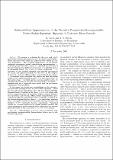Reduced-Basis Approximation of the Viscosity-Parametrized Incompressible Navier-Stokes Equation: Rigorous A Posteriori Error Bounds
Author(s)
Veroy, K.; Patera, Anthony T.
DownloadHPCES013.pdf (523.5Kb)
Metadata
Show full item recordAbstract
We present a technique for the rapid and reliable prediction of linear-functional outputs of elliptic partial differential equations with affine (or approximately affine) parameter dependence. The essential components are (i) rapidly uniformly convergent global reduced-basis approximations — Galerkin projection onto a space WN spanned by solutions of the governing partial differential equation at N selected points in parameter space; (ii) a posteriori error estimation — relaxations of the residual equation that provide inexpensive yet sharp and rigorous bounds for the error in the outputs of interest; and (iii) offline/online computational procedures — stratagems which decouple the generation and projection stages of the approximation process. The operation count for the online stage — in which, given a new parameter value, we calculate the output of interest and associated error bound — depends only on N (typically very small) and the parametric complexity of the problem.
In this paper we extend our methodology to the viscosity-parametrized incompressible Navier-Stokes equations. There are two critical new ingredients: first, the now-classical Brezzi-Rappaz-Raviart framework for (here, a posteriori) error analysis of approximations of nonlinear elliptic partial differential equations; and second, offline/online computational procedures for efficient calculation of the "constants" required by the Brezzi-Rappaz-Raviart theory — in particular, rigorous lower and upper bounds for the BabuÅ¡ka inf-sup stability and Sobolev "L⁴-H¹" continuity factors, respectively. Numerical results for a simple square-cavity model problem confirm the rapid convergence of the reduced-basis approximation and the good effectivity of the associated a posteriori error bounds.
Date issued
2004-01Series/Report no.
High Performance Computation for Engineered Systems (HPCES);
Keywords
reduced-basis, a posteriori error estimation, output bounds, incompressible Navier-Stokes, elliptic partial differential equations